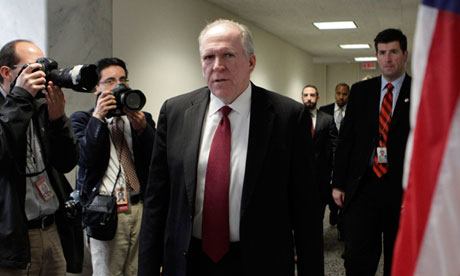John Brennan faces grilling over drone leak as senators demand answers
Nominee for CIA director set for tough confirmation questions from senators angered by lack of White House clarity on drones

John Brennan, nominee
for CIA director, arrives at a meeting with Senate intelligence
committee chairman Dianne Feinstein. Photograph: Yuri Gripas/Reuters
John Brennan, Barack Obama's nominee for CIA director, will come under renewed pressure at his confirmation hearing on Thursday to justify the targeted killing of US citizens in drone strikes, following the leak of a secret summary of the White House rationale for one its most controversial policies.
Senators angered by the lack of transparency over the legal basis for targeting Americans are planning to demand more details from Brennan, currently the White House counter-terrorism chief and a key architect of Obama's drones policy.
The white paper, leaked on Monday night and dating from 2011, was shown to senators several weeks ago, but failed to allay their concerns. It was made public by NBC and justifies the killing of those US citizens who hold senior positions in al-Qaida and pose an "imminent threat of violent attack" against America.
The white paper also provides some detail of the legal framework under US and international law for the drones policy, including that the US is at war with al-Qaida. But it has come under criticism from human rights groups for making too broad a case for killing, rather than capturing, suspected American and foreign terrorists.
Eleven senators wrote to the president on Monday demanding the administration hand over all legal justifications for killing US citizens by drones. They are pressing to see a more detailed 50-page memorandum from the office of legal counsel.
The letter, signed by eight Democrats and three Republicans, hints at confrontation over Brennan's appointment if the administration does not co-operate.
"We ask that you direct the Justice Department to provide Congress, specifically the judiciary and intelligence committees, with any and all legal opinions that lay out the executive branch's official understanding of the president's authority to deliberately kill American citizens," the letter said.
"The executive branch's co-operation on this matter will help avoid an unnecessary confrontation that could affect the Senate's consideration of nominees for national security positions."
The letter notes that the president has previously promised to share with Congress information that he cannot make public for national security reasons.
One of the signatories, senator Ron Wyden of Oregon, a member of the intelligence committee, responded to the white paper being made public by saying that it leaves unanswered many questions about the president's authority to order drone strikes that kill Americans.
"Questions like: 'how much evidence does the president need to decide that a particular American is part of a terrorist group?', 'does the President have to provide individual Americans with the opportunity to surrender?', and 'can the president order intelligence agencies or the military to kill an American who is inside the United States?' need to be asked and answered in a way that is consistent with American laws and American values. This memo does not answer these questions," he said.
Wyden also set the tone that Brennan is likely to encounter at his confirmation hearing when he also complained that the White House counter-terrorism chief has failed to respond to a letter the senator sent him three weeks ago asking about the legal basis and practical rules for the targeting of US citizens by drone.
That letter said: "For the executive branch to claim that intelligence agencies have the authority to knowingly kill American citizens but refuse to provide Congress with any and all legal opinions that explain the executive branch's understanding of this authority represents an alarming and indefensible assertion of executive prerogative," Wyden was also frustrated that the administration would not tell Congress which countries drone attacks were being carried out in.
A congressional staff member with knowledge of the issue said Brennan is likely to face detailed questioning about the legal basis for a drones policy he helped forge.
"The white paper raised a lot of questions that can only be answered by access to the detailed legal justifications the administration has consistently refused to share (with Congress)," he said. "John Brennan is at the heart of this policy. It would be my expectation he will face a lot of questions. There's no national security issue around a legal opinion. There is no reason why Americans cannot know the legal basis for the administration killing Americans."
The white paper has drawn criticism from human rights groups, which say its legal justifications for drone strikes are ill-defined.
Andrea Prasow, senior counter-terrorism counsel for Human Rights Watch, said she was particularly troubled by the white paper's claim that a person would only be killed when it was not feasible to capture them.
She said the policy was a deception. "The US government has said that it will capture someone where feasible rather than immediately target them. But when you read the white paper you realise that they really mean when capture is feasible at the same moment they think killing the person is," she said.
"By affirmatively saying to the public that the US government seeks to capture people rather than kill them they've set a standard they should be held to. But when you actually read the legal authorisation you realise they have defined themselves out of the standard."
Prasow also said the white paper reveals that the Obama administration has effectively shunned international law.
"What is striking about the white paper is that it doesn't seek to track international law. It tracks US law. When the US is engaging in lethal conduct in other nations it must be in compliance with international law, and the white paper doesn't suggest that it takes that requirement seriously.
The US government has repeatedly talked about compliance with lawful principles, and the white paper says that. But that's different from complying with the laws of war," she said.
No comments:
Post a Comment